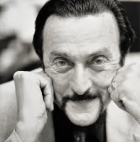From Heavens to Hells to Heroes
The poet John Milton gave highest praise to the human mind when he wrote in 'Paradise Lost', "The mind is its own place, and in itself can make a heaven of hell, a hell of heaven." I have been celebrating that mental agility for most of my life, as a research psychologist for the past fifty years, but even before that as a child of only five years. Before I describe how I helped to transform the paradise that is Palo Alto, California, and Stanford University, into a hell on earth for a group of college students that I imprisoned in a dramatic experiment, allow me first to note briefly how I also mentally transformed a living hell into my optimistic heaven.
Having developed the contagious disease of whooping cough compounded by double pneumonia, I was sent to Willard Parker Hospital, on the east side of Manhattan, to join hundreds of other poor kids suffering from every conceivable contagious disease. It was winter 1939, before the advent of wonder drugs, penicillin or sulfa, that would have helped us to survive. It was also an era before exercise was valued, so we lay in our cots day and night, never allowed to stand or stretch, or do anything that might disturb the nurses. There was no TV, of course, but also no radio or music or telephones or games or anything to do except to read comic books. Parents were restricted to visiting only a few hours on Sundays, when they were able to brave the long walk from the subway in winter storms. When they could not come, they couldn’t call to let their desperately lonely children know they would surely come next week. And naturally, we all worried that they might forget where we were. When they did come, we were separated by a huge glass wall, across which we tried to touch or kiss against before the nurses noticed and forbade this minimal moment of intimacy. Because kids were coughing and wheezing constantly, the nurses all wore masks, and had learned to harden themselves against getting emotionally involved with any of us; a kind of “detached concern” for their welfare charges.
And then night fell. Having not done anything all day but reread comic books, no one was tired, but lights were out promptly at 8 PM, and we had to pretend to sleep. It was hard to sleep, with so much noise from the constant crying and coughing, and with the black figures that slithered across the walls as the light from the nurses’ station projected scary shadows. We knew it was the Devil coming to look us over for his wicked selections. The kids around my bed all agreed never to say that dumb prayer, “Now I lay me down to sleep, I pray the Lord my soul to keep; If I should die before I wake, I pray the Lord my soul to take.” It did not matter whether we said it or not, when morning finally arrived, “Billy had gone home,” or “Johnny’s folks came to take him home.” Kids died in a game of genetic roulette, without medication or health savvy treatment. But we all formed a silent conspiracy of denial among nurses and kids, to deny the reality of death taking us one by one. It was the only way we could sustain hope of ever being released alive. We knew that “going home” was really going to your grave, but we suppressed that ominous thought and replaced it with visions of our departed friends back home riding their bicycles, playing stickball, or just having fun. And we desperately imagined that when our turn came to go home, we would really go home and not go there.
I endured this nightmare for 5 months, through Christmas, New Years, my birthday in March, and eventually, magically, I was paroled right after Easter. When my parents tried to comfort me for the suffering I endured, I accepted none of those tears and sympathy. I had erected a different frame for the picture of poor little Philip – I had a great time in that charity ward at Willard Parker Hospital! I made lots of close friends, I learned to read and write before I went to school, I learned to ingratiate myself with the nurses using compliments to get extra pats of butter or sugar, and I developed leadership skills by being able to come up with interesting group games we could play from our dozens of beds, like we were a navy sailing down the Nile in search of the magic white crocodile. In my mind, I continued to make a heaven of this hell for many years afterwards, until the spell was broken when I confronted one of my students in a hospital dying of AIDS. But that is another story, for another day.
The Stanford Prison Experiment
Fast forward to summer 1971; I became Superintendent of the Sanford Prison, an experimental prison run by psychologists, not by the state. I wanted to understand better what happens when you put good people in a bad place, like prison. Who or what wins? Instead of observing what happens in real prisons that generate so much violence, I needed to separate what is usually confounded, the kind of prisoners and guards who populate prisons from the kind of forces operating in such places. To do so, it was necessary to conduct a controlled experiment, to select a group of volunteers who were normal, healthy young men with no history of crime or violence, and then randomly assign them to play the roles of prisoner or guard in a two-week long experiment in which we could observe and record everything that happened. Those assigned to be prisoners lived in their cells and on the prison yard all the time, 24/ 7; the guards worked 8 hour shifts.


